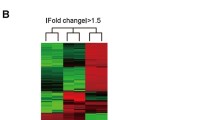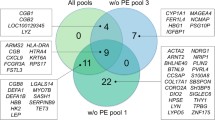Abstract
Objectives
To investigate the alterations in gene profile of placenta from pregnant women with intrahepatic cholestasis of pregnancy (ICP) and to enhance the insight of etiology and pathogenesis of ICP.
Methods
Ten pregnant women diagnosed ICP were recruited and 10 healthy pregnant women served as control. Four samples were taken from each placenta and RNA was isolated. Gene expression was analyzed with microarray and real time PCR was used to validate the differentially expressed genes.
Results
392 genes were found differentially expressed. Among these differentially expressed genes, 280 were up-regulated and 112 were down-regulated. These differentially expressed genes involved 20 categories including genes involved in transportation, cell growth, apoptosis and immune response that were putatively participated the pathogenesis of ICP.
Conclusions
293 differentially expressed genes of 20 categories were found in ICP placenta, suggesting the diversity of gene expression alteration and the complexity of etiology and pathogenesis of ICP.

Similar content being viewed by others
References
Lammert F, Marschall HU, Glantz A, Matern S (2000) Intrahepatic cholestasis of pregnancy: molecular pathogenesis, diagnosis and management. J Hepatol 33(6):1012–1021
Beuers U, Pusl T (2006) Intrahepatic cholestasis of pregnancy—a heterogeneous group of pregnancy-related disorders? Hepatology 43(4):647–649
Riely CA, Bacq Y (2004) Intrahepatic cholestasis of pregnancy. Clin liver dis 8(1):167–176
Fisk NM, Storey GN (1988) Fetal outcome in obstetric cholestasis. Br J Obstet Gynaecol 95(11):1137–1143
Bacq Y, Sapey T, Bréchot MC, Pierre F, Fignon A, Dubois F (1997) Intrahepatic cholestasis of pregnancy: a French prospective study. Hepatology 26(2):358–364
Rioseco AJ, Ivankovic MB, Manzur A et al (1994) Intrahepatic cholestasis of pregnancy: a retrospective case-control study of perinatal outcome. Am J Obstet Gynecol 170(3):890–895
Laatikainen T, Ikonen E (1975) Fetal prognosis in obstetric hepatosis. Ann Chir Gynaecol Fenn 64(3):155–164
Shaw D, Frohlich J, Wittmann BA, Willms M (1982) A prospective study of 18 patients with cholestasis of pregnancy. Am J Obstet Gynecol 142(6 Pt 1):621–625
Alsulyman OM, Ouzounian JG, Ames-Castro M, Goodwin TM (1996) Intrahepatic cholestasis of pregnancy: perinatal outcome associated with expectant management. Am J Obstet Gynecol 175(4 Pt 1):957–960
Williamson C, Hems LM, Goulis DG et al (2004) Clinical outcome in a series of cases of obstetric cholestasis identified via a patient support group. BJOG 111(7):676–681
Zhao YJ, Yue YF, Liu XQ, Li SH, Liu ZY, Wang Y (2004) Study on relationship between serum cholylglycine and placental apoptosis in patients with intrahepatic cholestasis of pregnancy (in Chinese). Zhonghua Fu Chan Ke Za Zhi 39(7):446–448
Wang DM, La XL, Ding L (2003) Study on apoptosis and expression of Fas, FasL in placenta of intrahepatic cholestasis of pregnancy (in Chinese). Chin J Perinat Med 6(4):199–201
Zhang SJ (2007) Immunohistochemical study on the expression of TNF-α in placenta in intrahepatic cholestasis of pregnancy (in Chinese). Acta Acad Med Xuzhou 27(7):451–452
Dong MY, He J, Wang ZP (2003) Placental expression of epidermal growth factor receptor in intrahepatic cholestasis of pregnancy. Chin J Obstet Gynecol 38(2):106–107
Watson A, Mazumder A, Stewart M, Balasubramanian S (1998) Technology for microarray analysis of gene expression. Curr Opin Biotechnol 9:609–614
Smith L, Greenfield A (2003) DNA microarrays and development. Hum Mol Genet 12(1):R1–R8
Schena M, Shalon D, Davis RW, Brown PO (1995) Quantitative monitoring of gene expression patterns with a complementary DNA microarray. Science 270(20):467–470
Dong M, Shi Y (1996) Evaluation of cholic glycine in serum and hemorrheological parameters in women with intrahepatic cholestasis of pregnancy (in Chinese). Curr Adv Obstet Gynecol 5:251–253
Dong M, Wang Z, He J, Shi Y, Yang P, Pan Y (1999) Increased anticardiolipin antibody in intrahepatic cholestasis of pregnancy (in Chinese). Chin J Obstet Gynecol 34:491
Dong M, Xie X, Wang Z, He J, Zhou J (2002) Impaired mixed lymphocyte reaction in intrahepatic cholestasis of pregnancy (in Chinese). Gynecol Obstet Invest 54:191–195
Cristofalo VJ (2000) A DNA chip off aging block. Nat Med 6(5):507
Wang ZP, Dong MY, Chu HN, He J (2004) Increased serum levels of neopterin and soluble interleukin-2 receptor in intrahepatic cholestasis of pregnancy. Acta Obstet Gynecol Scand 83(11):1067–1070
Peng B, Liu SY (2002) Study of relationship between T helper cell type1 and type2 cytokines and intrahepatic cholestasis of pregnancy (in Chinese). Zhonghua Fu Chan Ke Za Zhi 37(9):516–518
Ling B, Yao FQ, Zhou Y, Chen ZZ, Shen GD, Zhu YY (2007) Cell-mediated immunity imbalance in patients with intrahepatic cholestasis of pregnancy. Cell Mol Immunol 4(1):71–75
Koehler LH, Benz EJ (1962) Serum adenosine deaminase: methodology and clinical applications. Clin Chem 8:133–140
Ungerer JP, Oosthuizen HM, Bissbort SH, Vermaak WJ (1992) Serum adenosine deaminase: isoenzymes and diagnostic application. Clin Chem 38(7):1322–1326
Trajkovic V, Sweet MJ, Xu D (2004) T1/ST2—an IL-1 receptor-like modulator of immune responses. Cytokine Growth Factor Rev 15(2–3):87–95
Xu D, Chan WL, Leung BP et al (1998) Selective expression of a stable cell surface molecule on type 2 but not type 1 helper T cells. J Exp Med 187(5):787–794
Löhning M, Stroehmann A, Coyle AJ et al (1998) T1/ST2 is preferentially expressed on murine Th2 cells, independent of interleukin 4, interleukin 5, and interleukin 10, and important for Th2 effector function. Proc Natl Acad Sci USA 95(12):6930–6935
Coyle AJ, Lloyd C, Tian J et al (1999) Crucial role of the interleukin 1 receptor family member T1/ST2 in T helper cell type 2-mediated lung mucosal immune responses. J Exp Med 190(7):895–902
Dann AT, Kenyon AP, Wierzbicki AS, Seed PT, Shennan AH, Tribe RM (2006) Plasma lipid profiles of women with intrahepatic cholestasis of pregnancy. Obstet Gynecol 107(1):106–114
Spreyer P, Schaal H, Kuhn G et al (1990) Regeneration-associated high level expression of apolipoprotein D mRNA in endoneurial fibroblasts of peripheral nerve. EMBO J 9(8):2479–2484
Xia SY, Chen ZQ, Li L (2003) Change of vascular endothelial growth factor (VEGF) and its significance in placenta for patients with intrahepatic cholestasis in pregnancy (in Chinese). J Chin Phys 5(8):1068–1070
Liu JP, Baker J, Perkins AS, Robertson EJ, Efstratiadis A (1993) Mice carrying null mutations of the genes encoding insulin-like growth factor I (Igf-1) and type 1 IGF receptor (Igf1r). Cell 75(1):59–72
DeChiara TM, Efstratiadis A, Robertson EJ (1990) A growth-deficiency phenotype in heterozygous mice carrying an insulin-like growth factor II gene disrupted by targeting. Nature 345(6270):78–80
Lin CG, Leu SJ, Chen N et al (2003) CCN3 (NOV) is a novel angiogenic regulator of the CCN protein family. J Biol Chem 278(26):24200–24208
Ellis PD, Chen Q, Barker PJ, Metcalfe JC, Kemp PR (2000) Nov gene encodes adhesion factor for vascular smooth muscle cells and is dynamically regulated in response to vascular injury. Arterioscler Thromb Vasc Biol 20(8):1912–1919
Gellhaus A, Schmidt M, Dunk C, Lye SJ, Kimmig R, Winterhager E (2006) Decreased expression of the angiogenic regulators CYR61 (CCN1) and NOV (CCN3) in human placenta is associated with pre-eclampsia. Mol Hum Reprod 12(6):389–399
Chen M, Sun LZ, Ding HJ, Wu WP (2007) The relationship between intrahepatic cholestasis and placenta cells apoptosis in pregnancy (in Chinese). Mod Med J 35(6):428–431
Perez MJ, Macias RI, Marin JJ (2006) Maternal cholestasis induces placental oxidative stress and apoptosis. Protective effect of ursodeoxycholic acid. Placenta 27(1):34–41
Huang JR, Liu J, Chang SF (2006) Mechanism of farnesoid X receptor and bile salt excretory pump on bile acid transport in placenta of intrahepatic cholestasis of pregnany (in Chinese). Chongqing Med J 174:9–1950
Floreani A, Carderi I, Paternoster D et al (2008) Hepatobiliary phospholipid transporter ABCB4, MDR3 gene variants in a large cohort of Italian women with intrahepatic cholestasis of pregnancy. Dig Liver Dis 40(5):366–370
Arrese M, Macias RI, Briz O, Perez MJ, Marin JJ (2008) Molecular pathogenesis of intrahepatic cholestasis of pregnancy. Expert Rev Mol Med 28:10:e9
Serrano MA, Macias RIR, Briz O et al (2007) Expression in human trophoblast and choriocarcinoma cell lines, BeWo, Jeg-3 and JAr of genes involved in the hepatobiliary-like excretory function of the placenta. Placenta 28:107–117
Patel P, Weerasekera N, Hitchins M, Boyd CAR, Johnston DG, Williamson C (2003) Semi quantitative expression analysis of MDR3, FIC1, BSEP, OATP-A, OATP-C, OATP-D, OATP-E and NTCP gene transcripts in 1st and 3rd trimester human placenta. Placenta 24:39–44
Acknowledgment
This study was financially supported by ZJNSF (No Y205297).
Author information
Authors and Affiliations
Corresponding author
Additional information
J. Wei and H. Wang were contributed equally.
Rights and permissions
About this article
Cite this article
Wei, J., Wang, H., Yang, X. et al. Altered gene profile of placenta from women with intrahepatic cholestasis of pregnancy. Arch Gynecol Obstet 281, 801–810 (2010). https://doi.org/10.1007/s00404-009-1156-3
Received:
Accepted:
Published:
Issue Date:
DOI: https://doi.org/10.1007/s00404-009-1156-3




